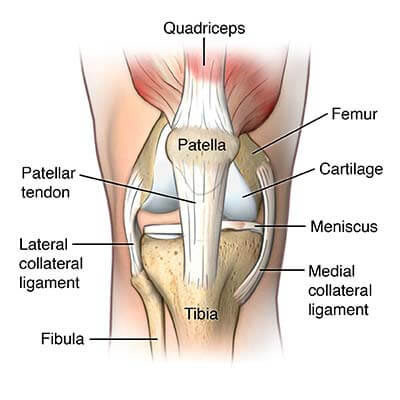 Midtown Manhattan
36 W 44th St Ste 1416 New York, NY 10036
Midtown Manhattan
36 W 44th St Ste 1416 New York, NY 10036
- (212) 621-7746
- text us
- BOOK ONLINE Same Day Appointments
 Midtown Manhattan
36 W 44th St Ste 1416 New York, NY 10036
Midtown Manhattan
36 W 44th St Ste 1416 New York, NY 10036
Knee pain treatment is essential, as pain behind the knee can lead to serious complications if left unaddressed. At the very least, back-of-knee pain and posterior and inner knee pain can sideline you indefinitely until you find some knee pain relief. Pain in your knee can result from a large number of causes and should be investigated by a top knee pain specialist. Meet our doctor specializes in knee injuries, and a leading pain management doctor Dr. Melepura to get the pain relief you need in the safe, reassuring hands of the best pain management specialist in NYC
 Knee pain complaints at sports medicine offices in Manhattan are nearly as common as back pain reports. And just as when you seek relief from lower back pain, relieving pain in the knee is often as easy as simple homecare techniques as directed by our sports and pain management team.
Knee pain complaints at sports medicine offices in Manhattan are nearly as common as back pain reports. And just as when you seek relief from lower back pain, relieving pain in the knee is often as easy as simple homecare techniques as directed by our sports and pain management team.
At the same time, treatment for knee pain may require many other, more substantial techniques. It all depends on the source of your discomfort and the final diagnosis. In Midtown Manhattan, your best choice for knee pain treatment is close by at the Sports and Pain Institute in New York City.
Arthritis, injuries, and deformities are the main culprits behind painful symptoms inside or outside the knee for many New Yorkers. The source of your pain can come from so many different moving parts in the knee — where you have cartilage, bone, tendons, ligaments, and bursa sacs. Injuries to any of these areas can lead to pain from one of the following:
Referred pain also is common and can lead to posterior or inner knee pain when you have tendon damage in your hips, feet, or ankles.
Symptoms that do not subside within a few weeks should always be evaluated with a thorough consultation and examination by an experienced doctor for an accurate diagnosis and treatment plan as it may be a symptom of a serious condition that needs full evaluation by pain specialists for appropriate workup.
Many different sports activities make you a candidate for a knee injury and subsequent pain. Athletes involved in certain sports are at the highest risk for a knee injury, pain behind the knee and in the upper leg, and posterior and inner knee pain.
Orthopedic knee doctors around the world agree that some of the riskiest sports include:
Other factors that can warrant the visit to Dr. Melepura that might lead to the need for knee pain relief include:
Dr. Melepura can find the precise cause of your symptoms and provide the most advanced modalities to treat them. Emergency, same-day appointments in Midtown, Manhattan are available for everyone in pain.
He is an amazing doctor. Explained everything and wanted to know if I had questions. He gave me a shot in my knee. I could not believe it was over. The young lady at the front desk was so kind and welcoming. I would definitely recommend him. I have other visits scheduled for follow up.
Fernie DasentThough there could be numerous culprits behind pain in the knee, most share the same symptoms, including:
There are two distinct types of knee pain, such as:
It’s important that our physician gets a complete picture of your knee pain history before coming up with a treatment plan. He needs to know when your pain first started, how bad it gets, when it’s worse, and what gives you relief, if anything. Diagnostic tests for knee pain may include:
There are several ways to lower your risk of knee pain, including:
Additionally, stick to smooth, paved roads rather than uneven, rocky ones when you’re out walking.
Treatment always begins with the most conservative techniques, such as physical therapy, strengthening exercises, over-the-counter anti-inflammatory medications, and rest. Often, treating underlying conditions such as obesity or rheumatoid arthritis can lead to significant relief.
When the first line of knee pain treatments fails, you may need to visit a qualified knee pain specialist for something stronger or more invasive, such as:
You should consider visiting an orthopedic physician as soon as possible to receive the appropriate treatment for your knee pain if any of the following criteria apply to you:
Untreated knee injuries can cause permanent damage. If you have severe or chronic knee pain, you should see a doctor right away. The skilled doctors at the Sports Injury & Pain Management Clinic of NYC can quickly diagnose and treat your condition, getting you back on your feet in no time.
Do you have any questions about the knee pain treatment options we offer in NYC? Would you like to schedule an appointment with Dr. Febin Melepura, MD, at a pain management clinic in New York? Please contact our office for a consultation with the knee pain specialist.

Febin Melepura, MD is a top rated, best in class interventional pain management doctor. He is a nationally recognized pain relief specialist and is among the top pain care doctors in New York City and the country. He is an award winning expert and contributor to a prominent media outlets.
Dr. Febin Melepura has been recognized for his thoughtful, thorough, modern approach to treating chronic pain and, among other accolades, has been named a “top pain management doctor in New York”, and one of “America’s Top Doctors™” for an advanced sports injury treatments.